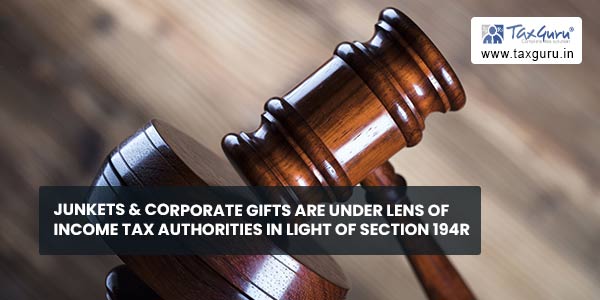As per the CMO Survey reports, companies across the world shell out most of their financial resources in marketing of their commodities with an average of minimum 12%. Their marketing budget may vary from industry to industry with highest marketing budget allocated by consumer-packaged goods, followed by consumer services, tech software, communication etc.…
The industries spend huge proportion on their marketing cost towards benefits or perquisites in the form of foreign trips, expensive gifts, vehicles etc. to their wholesale & retail distributors, brand ambassadors. These expenses were claimed as business expenditure in the Income Tax Returns filed by them.
Under Section 28(iv) of the act, the same shall be chargeable as business income in the hands of recipient of such benefit or perquisite .In other words the value of any benefit or perquisite, whether convertible into money or not, arising from business or the exercise of profession shall be offered to income of recipient under the head Profits and gains of business and profession.
As per the memorandum to Finance Bill 2022, it was observed that in many cases such recipient of benefits or perquisites are not disclosing the same in taxable income while filing their income tax returns, resulting in furnishing of incorrect particulars of income and revenue leakage to the Government. To plug these loopholes and deepen the tax base, the new provision Section 194R was inserted in the Income Tax Act vide clause 58 of Finance Bill 2022 and the same shall be effective from 1st July 2022.

Salient Features of Section 194R
a) The provisions of section 194R are applicable to the resident person, receiving any benefit or perquisite in cash or kind, in relation to their business or profession .
b) The applicable rate of TDS on such benefit or perquisite shall be @ 10% of the value or aggregate value of the benefit or perquisite.
c) Tax is required to be deducted before providing such benefit or perquisite to the resident person.
d) For applicability of section 194R, the value or aggregate value of the benefit or perquisite paid or likely to be paid during the financial year should be Rs. 20,000 or more.
e) Further, provision of section 194R shall also be applicable to resident Individuals/HUF if their total/ gross receipts/ turnover is more than one crore rupees in case of business or fifty lakh rupees in the case of profession during the immediate preceding financial year in which such benefit or perquisite as the case maybe, is provided.
In light of the above salient features let us try to understand the meaning of important phrases mentioned under Section 28(iv) read with Section 194R of the Act.
| S.no | Particulars | Legal Precedent |
| 1 | “Whether convertible into money or not” | The Hon’ble Supreme Court in the case of Commissioner vs. Mahindra and Mahindra Ltd (2018) 93 taxmann.com 32 (SC) has held that for invoking provisions of Section 28(iv) the benefit or perquisite has to be received in some form other than money. In other words, the amount received in cash or cash equivalent would not be regarded as perquisites.
Note: TDS under Section 194R is also required in a case where benefit/ perquisite is partly in cash and partly in kind. On bare reading it was understood that Section 194R provisions are not in tandem with chargeability provisions under Section 28(iv) of the Act. In this regard clarification from the department is required to avoid unnecessary tax litigation. |
| 2 | Benefit or perquisite | In the case of Helios Food Improvers (P) Ltd (2007) 14 SOT 546 (Mum.) the Hon’ble ITAT Mumbai Bench observed that the term “perquisite” denotes meeting out of an obligation of one person by another person directly or indirectly or provision of some facility or amenity by one person to another. The word “benefit” has also to be interpreted in the same manner i.e. during business transaction one party should give irretrievable benefit or advantage to other party. |
Dilemma in Principles of Valuation
It is also relevant to note here that the provisions of Section 194R are liable to be deducted on the value or aggregate value of benefit or perquisite rather than on consideration. There is no clarity with respect to the meaning assigned to the term ‘value’ of the benefit or perquisite. Unlike Rule 3 valuation for computation of salary income there are no specific provisions under the Income Act to determine the value of benefit or perquisite for the purpose of Section 194R.
It is pertinent to note here that in case of benefits or perquisites provided to resident person is provided out of outright purchase from open market or out of captive production of the assessee itself in their factory, then there shall be issues whether the value of benefit or perquisite should be determined as per purchase price or market retail price or arm’s length price or manufacture cost. Further, whether any benefit of discount shall be made available to value of benefit or perquisite to be provided ??
Further whether any benefit received under condition of the contract can be termed as benefit or perquisite liable for deduction of TDS under Section 194R. For example, as per work order, the food and logistic arrangements shall be made by the client on behalf of the advocate appearing in client case before High Court of Andhra Pradesh. Now questions arises whether provisions of 194R shall be attracted on value of food and logistic arrangements made by the client to the advocate ???
Re-opening of previous Assessments
It is also relevant to note here that the provisions of Section 194R may trigger the re-opening of past assessments of assessee who has not disclosed the value of benefit or perquisite under Section 28(iv) in return of income for the earlier years.
Cash Crunch
Section 194R also pose working capital/funds blockage to the resident person receiving the benefit or perquisite
Way Forward
Considering the ambiguities in valuation of benefits and perquisites, the department may issue clarifications or frame valuation rules in relation to Section 194R provisions to avoid uncertainty in interpretation and applicability of Section 194R. The business entities have to be judicious while interpreting and applying 194R provisions in their day-to-day business transactions. Any short sighted approach may result in disallowance of their business expenditure.
(the views expressed in this article are strictly personal and author of this article can be reached at caprudhvigst@gmail.com)






Normally these perks or benefits claimed as reimbursement like out of pocket expenses and stay expenses claimed by Statutory auditors of Banks. Then it works like TDS as bills will b reimbursed after TDS. But in case of direct payment by deductor to travel agency or hotels it works like TCS . The interplay between TDS and TCS also to b elucidated.